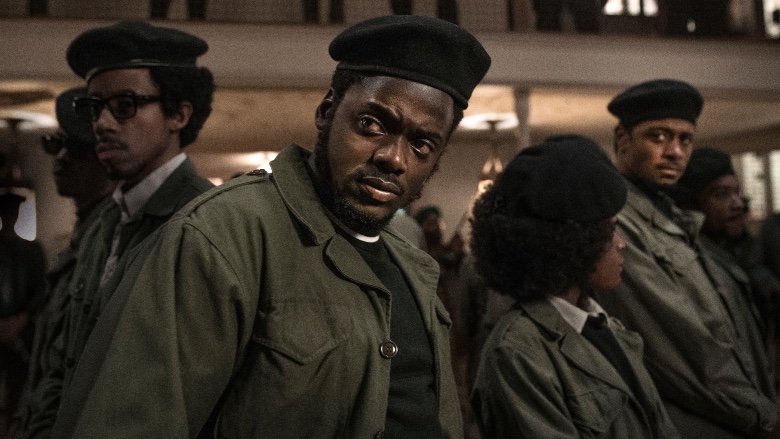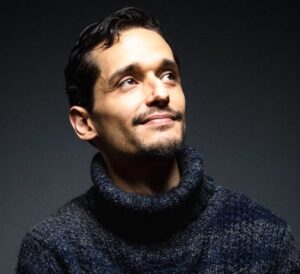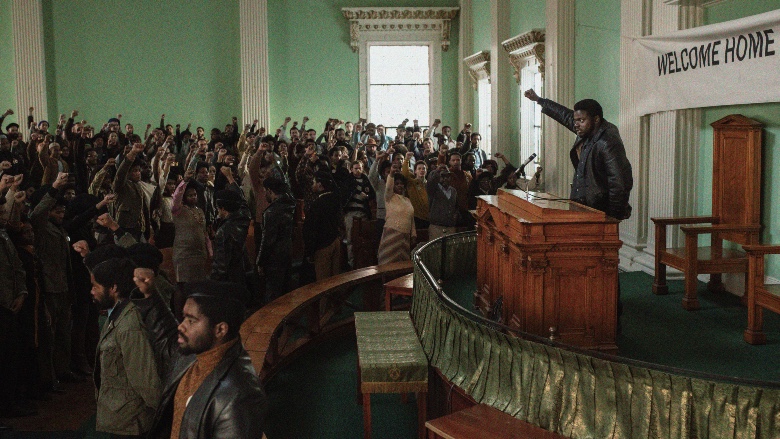
Threatened with prosecution by the FBI, William O’Neal (Lakeith Stanfield) instead becomes a turncoat infiltrating the Black Panther party in the 1960s. His mission? To help bring down the leader of the Illinois chapter, Fred Hampton (Daniel Kaluuya). The two actors — who collaborated together in the Oscar-winning Get Out — steal the show as two difficult and complex individuals—one whose motivations are never entirely sympathetic, the other whose approach may be unorthodox but ultimately understandable. This forms the dramatic backdrop of Shaka King’s upcoming Judas and the Black Messiah, which made a splash at the 2021 Sundance Film Festival and is a late-breaking contender for the awards season.
The script presents an interesting amalgam of action with historical exposition—visibly an editing challenge. Last week, Below the Line spoke to Kristan Sprague, the director’s college friend and editor of the film — his first feature length feature — about the adventure of cutting such a taut, enthralling, and at times even suspenseful picture.

Below the Line: After years of working on shorts and TV, how did it come about for you to work on this project?
Kristan Sprague: Shaka and I are longtime friends, we went to college together. He called me early on and told me he wanted me on the film, but I had to be interviewed by Warner Bros. That was an interesting experience. I had to sell myself to a group of people though I know the director wanted me. So I presented my ideas for the film, how I thought it could come together. I had read the script, and I immediately thought “Wow, this is a film I would watch. I want to work on this project.”
BTL: How did you approach being an editor moving from smaller media to a big studio film?
KS: Well, there were a lot of opinions and a lot of eyes on my work. That was different, but I was confident in my approach and everyone was very receptive. I tried to balance the action and the biopic aspects of the movie. We ran through several iterations of it, and that is one of the benefits of working with a bigger budget. We had cuts that were very “action-y,” and then other slower versions that exposed more of the biography. We rejected the extremes when we go too much to one side or the other, because this is such a rich story, that we wanted to balance the two aspects as a way of keeping the audience engaged.
BTL: What were some of the memorable parts in Judas and the Black Messiah that you enjoyed editing?
KS: Well there was a lot of stuff in the picture that was more dramatic than I was used to, a lot of it also moved very quickly. I thought “We need to slow some of this down” somehow. The audience likes action, but there is so much to unpack in these characters. I remember working closely with [Cinematographer] Sean [Bobbitt] on position and reposition, on providing angles that were closer to the characters to help us slow down the action. The movie sped itself up naturally.

BTL: In the actual editing process, did you find the need to reshoot anything, or did you get stuck somewhere?
KS: There were definitely one or two scenes that I would have wanted to revisit but the pandemic hit just as we were getting into the thick of it. I ended up doing a lot of it remotely. Shaka had very specific ideas of how he wanted the scenes to play together, too, and we had sort of agreed from the beginning as to the structure and narrative. I had free reign in terms of the pacing, but the story was set. He is such a talented guy and knows exactly what he was doing and his vision played out almost as he had described it. So yeah, maybe there was one or two sequences I would have liked to take another look at, I think it was a good thing that we were not able to, because it forced me to be creative with what we have.
BTL: Other than the many eyes on your work, how did your job change as an editor from one medium to another?
KS: The cast. Everyone is so talented but yet so friendly and down to earth. Editors do not necessarily interact with the cast but I was there for a lot of it. Knowing the sort of roles they played and what personalities they brought to each of them gave me a jumping point to what I wanted to convey from them by splicing the action together. It was an unusual but rewarding experience, especially in retrospect, after the actual editing process became much more isolated than it even is normally.
BTL After this experience, what kind of work would you want to do, or what are you working on now?
KS: I’m looking at a lot of very interesting COVID-19-related shorts. There are a lot of interesting films coming down the pipeline right now. Even some comedies, though I’m not sure we are ready for that space, though I do like comedies. But this was an incredible experience. I felt confident and ready to start, but I did learn a lot about how to handle different types of narrative flows. I’m very grateful to Shaka for the opportunity. He is a brilliant guy and a good friend.
Judas and the Black Messiah premiered at the Sundance Film Festival and will be released by Warner Bros. in theaters and on HBO Max on February 12.
All pictures courtesy of Warner Bros. Pictures. Photos by Glenn Wilson.





